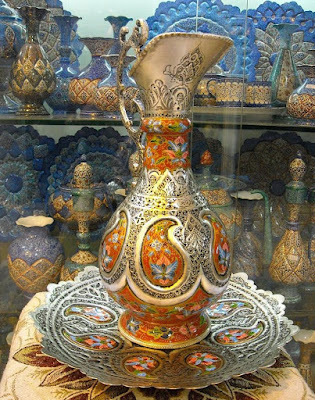Dear Haijin, visitors and travelers,
Welcome at the second episode of November 2017 in which we are exploring "The Rubaiyat" by Omar Khayyam. "The Rubaiyat" is a collection of 101 quatrains, a four lined verse with rhyme in the 1st, 2nd and 4th line.
Omar Khayyam was a Persian poet and scholar and his poems were only discovered far after his death in 1131. "The Rubaiyat" is a renown collection, but Khayyam didn't write only these 101 quatrains. It is said that he wrote a lot of them.
Today's episode I have titled "dawn's left hand" and it's extracted from the 2nd quatrain of "The Rubaiyat". Let me first give you the 'original' quatrain in the first translation by Edward FitzGerald:
Dreaming when Dawn's Left Hand was in the Sky
I heard a Voice within the Tavern cry,
"Awake, my Little ones, and fill the Cup
Before Life's Liquor in its Cup be dry."
© Omar Khayyam (Tr. FitzGerald)
 |
| "Dawn's Left Hand" |
Background:
The False Dawn is certainly a reference to the zodiacal light. It is now known to result from the reflection of sunlight from interplanetary debris in the plane of the Earth’s orbit around the Sun (the ecliptic), and so is more especially visible (in the northern hemisphere) after sunset in spring and before dawn in autumn, at lower latitudes, where and when the plane of the ecliptic is more steeply inclined to the horizon. Being relatively faint, it is also more easily seen in places where the air is clear and free from the light pollution of modern cities. Hence in Omar Khayyam’s time and place, it would have been a much more visible phenomenon than it is for most of us today. As indicated above, in the northern hemisphere, it is visible both before sunrise (especially in September/October) and after sunset (especially in March/April), but only its morning appearance has ever been of any significance to Islam, as it can give a false message to the faithful about the onset of the true dawn, when the morning prayers begin, and especially during Ramadan, when both prayer and fasting begin. The phenomenon is referred to, somewhat obscurely, in Surah 2.187 of the Qur’an: “Eat and drink until the white thread of dawn appears to you distinct from its black thread, then complete your fast till the night appears.” (translation Abdullah Yusuf Ali)
 |
| false dawn |
In this verse is the first of many references to the Tavern and drinking wine, the recurring theme of the poem being “eat, drink and be merry, for tomorrow we die, and there is NOTHING after death.” The last two lines use Cup in a dual sense – “fill the Cup” in the third line means “pour a cup of wine to drink”, whilst the Cup in the last line is the first of many symbolic references to human beings, Cups being made from Clay as Adam was made from Clay by God.The life disappearing from the body of a human being at death is likened to the wine drying out in a cup.
Maybe you remember our CDHK month about Persian poetry. In that month we read poems by the Persian poet Hafiz. Hafiz wrote a lot of poems and there are even poems in which he describes the use of "morning wine".
[...] The dawn advances veiled with roses.
Bring the morning draught, my friends, the morning draught! [...] (Hafiz)
Whilst the morning draught might seem quite civilised to many of us, the injunction, made later in the same ode, to “drink…incessantly the pure wine” seems considerably more worrying! But then Hafiz did live in the days before a glass of wine counted as two units of a suggested weekly intake, and, in any case, his injunction may be a Sufic one, a striving for increasingly Divine Intoxication!
In the time of Khayyam it was a common use to drink wine in the early morning especially around the Ramadan.
 |
| Persian Wine Ewer |
In a later translation of "The Rubaiyat" this verse was translated in another way, more accesible for the reader:
Before the phantom of False morning died,
Methought a Voice within the Tavern cried,
"When all the Temple is prepared within,
"Why nods the drowsy Worshiper outside?"
Well ... a nice verse I would say, but drinking wine in the early morning isn't my "cup of tea", but in a way it attracted me to use it in my haiku for this episode:
at dawn
wine sparkles in the sun
night's left over
wine sparkles in the sun
night's left over
© Chèvrefeuille
Hm ... I like this one, how immodest, but it is true. This episode is open for your submissions tonight at 7:00 PM (CET) and will remain open until November 8th at noon (CET). I will publish our new episode later on. For now ... have fun!
(Sources: wikipedia; bob forrest web)
(Sources: wikipedia; bob forrest web)

Very nice haiku, with a whole story narrated in 3 lines, and the sparkles that can be seen.
ReplyDeleteYou make me blush my friend.
Delete